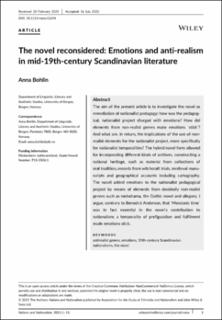The novel reconsidered: Emotions and anti-realism in mid-19th-century Scandinavian literature
Journal article, Peer reviewed
Published version

Åpne
Permanent lenke
https://hdl.handle.net/11250/2766078Utgivelsesdato
2021Metadata
Vis full innførselSamlinger
Sammendrag
The aim of the present article is to investigate the novel as remediation of nationalist pedagogy: how was the pedagogical, nationalist project charged with emotions? How did elements from non-realist genres make emotions ‘stick’? And what are, in return, the implications of the use of non-realist elements for the nationalist project, more specifically for nationalist temporalities? The hybrid novel form allowed for incorporating different kinds of archives, constructing a national heritage, such as material from collections of oral tradition, records from witchcraft trials, medieval manuscripts and geographical accounts including cartography. The novel added emotions to the nationalist pedagogical project by means of elements from decidedly non-realist genres such as melodrama, the Gothic novel and allegory. I argue, contrary to Benedict Anderson, that ‘Messianic time’ was in fact essential in the novel's contribution to nationalism; a temporality of prefiguration and fulfilment made emotions stick.
